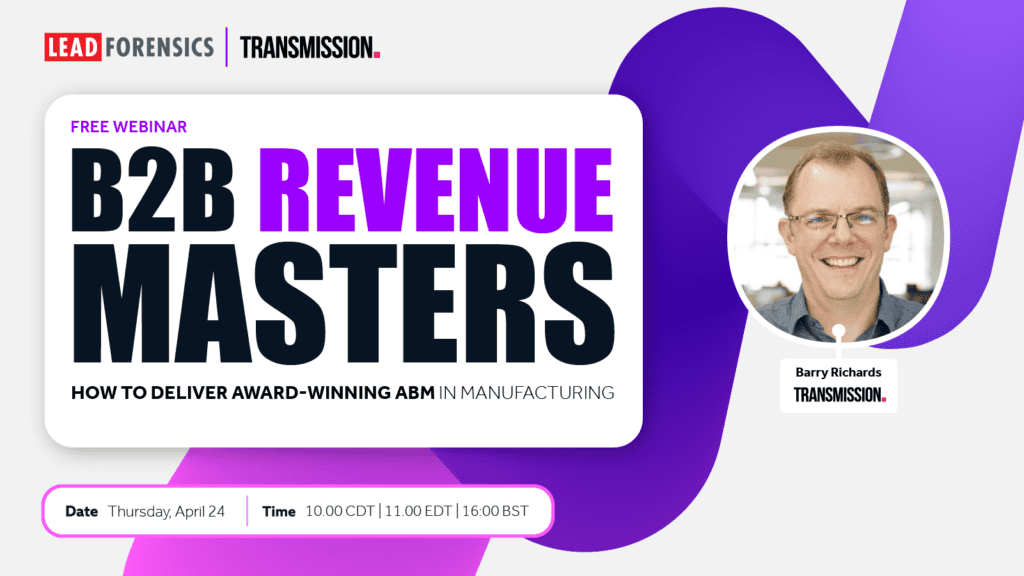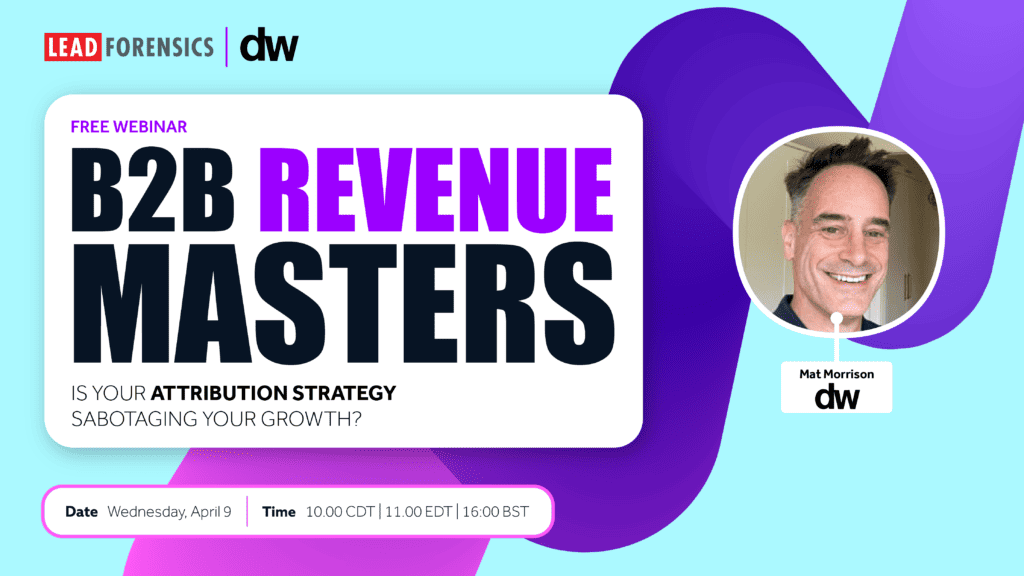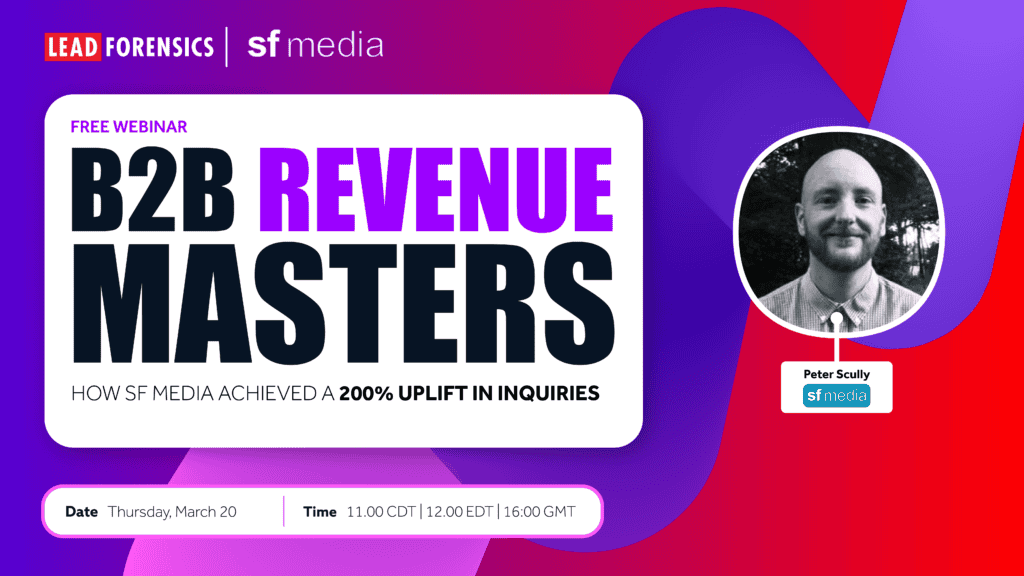Drive B2B success with a resilient sales pipeline
For Sales Managers across the world, improving the efficiency of their sales team remains a top priority and key to achieving that goal is successfully building a strong B2B sales pipeline. This webinar shows you how...
Webinar topic detail
You’ll hear about:
1. The sales pipeline explained
2. Measuring pipeline success with sales velocity
3. Reviewing and reporting your pipeline
4. Driving sales success with a resilient pipeline
5. Supporting every stage of the pipeline
Hello everyone, welcome along to today’s webinar and thank you for joining us. My name is Holly Tripp and I am the EMEA Event Marketing Manager here at Lead Forensics. I’m going to be taking today’s session and I will be talking about the power of a robust, resilient and powerful B2B sales pipeline. We’ll be covering:
The sales pipeline and what it means
Measuring pipeline success with sales velocity
Reviewing and reporting your pipeline
Driving sales success with a resilient pipeline
Sales software in action: supporting every stage of the pipeline
At Lead Forensics we’ve been helping B2B organisations achieve maximum success for more than a decade now. Our innovative solution is used by big name brands, sales teams, innovative marketers and B2B leaders alike, so we know a thing or two about building a pipeline that bounces back no matter what is thrown at it. If it’s a lack of opportunities at the top of your funnel, poor conversion rate or a lengthy sales process, the foolproof pipeline is definitely a must have. If you are a B2B sales leader you already know about the importance of this. Recognising the importance of this and actioning them to get the best result are two very different things and it’s the latter that drives your B2B sales team forwards and towards success.
You’ll have the opportunity to find out more about Lead Forensics and explore some examples of how our clients have successfully transformed their pipelines with our tool later in the webinar and you will also have an opportunity to book a free demonstration and the end with our poll as well. So without further ado we’ll get started and move on.
The first section we are going to be looking at today is the sales pipeline explained. Starting at the beginning, your sales pipeline is essentially a visual representation of the journey your potential buyers go on. That’s as they travel through the various stages of your B2B sales process. It should absolutely reflect your buyers specifically, so every business’s template is going to look differently but it can typically be broken down to 5 main stages.
Prospecting – the beginning of your pipeline. Here you need to be implementing effective lead generation strategies to fuel that pipeline with high quality and engaged opportunities.
Qualification – your team here needs to ensure that every lead is likely to convert so you need to put an effective qualification process in place to help improve that conversion rate.
Consideration – at this stage your team needs to be doing all they can to reassure and nurture the prospect. Working to move them through the pipeline quickly and efficiently.
Closing the sale – at this stage your lead has chosen you as the vendor they want to work with but you need to be doing everything you can to get the sign off. If you or your sales team are looking for more advice on closing more sales, then check out our recent webinar. We had one a few weeks ago which is Essential Tips for Closing Sales. Get in touch if you want to see the on demand version of that.
Retention – transforming those one off purchases into loyal customers through high quality customer service. Customer retention strategies are crucial here and identifying upselling and cross-selling opportunities wherever they are possible.
So now that we are clear on what the sales pipeline is, what it’s for and what it should look like typically. We are now going to explore how to measure it, making those key improvements and discovering how to build resilience with an unbeatable strategy and innovative technology, as well. Moving on to chapter 2
Measuring pipeline success with sales velocity
Sales velocity is a popular pipeline metric and it measures how quickly your organisation is generating revenue. Putting simply, the more money your business can make in the smallest amount of time, the better but how do you work that out?
To begin with there are some numbers that we need to know.
Opportunities – how many qualified leads do you have at the top of your funnel or the beginning of your pipeline.
Average deal size – so on average what is the dollar value of a deal. If you sell a subscription service, consider this amount as the average customer lifetime value.
Conversion rate – you also need to know how many of your leads convert to customers, the higher percentage here the better.
Pipeline length – how long does it take to convert that lead into a sale?
Once you’ve gathered those numbers up together, the equation you need to use is as follows:
Sales velocity = no. of opportunities x average deal size x conversion rate divided by the overall pipeline length.
So let’s say for example your organisation has 500 opportunities per month, your average deal size is $2,000, you have a conversion rate of 25% and then it takes an average of 30 days roughly for your leads to convert.
We’ll use these numbers to work out what the sales velocity would look like.
500 opportunities x $2,000 average deal size x 0.25 conversion rate
divided by pipeline length 30 days
$8,333 sales velocity
The number you are looking at here is roughly the amount of revenue you generate each day and that’s what the sales velocity really means.
If you want to improve that sales velocity, increase the revenue that you are generating, you need to make changes to one of the numbers in the equation and we’ve listed a couple of examples here.
Increase the number of opportunities at the start of your pipeline
Grow your average deal size
Boost your pipeline conversion rate
Reduce the time it takes to close a sale
Using those sales velocity equations, your representatives can have a clear understanding of the pace that potential customers are travelling through that pipeline enabling them to accurately forecast their results and estimate what it is that you’re going to bring in each month. That helps really to quite nicely segue into our next section.
Reviewing and reporting your pipeline
Reviewing your pipeline helps to monitor the productivity of your sales team and establish the efficiency of their pipelines and processes and identify where those changes need to be made. Making small consistent changes to your processes and really seeing the impact they have on your sales velocity is a really good indicator of what is and isn’t working. Scheduling regular catch ups with your team, ensuring they are prepared with all the relevant information about their pipelines. We also encourage transparency. So enable them to present any queries, any issues or any roadblocks they are facing, try questions that encourage new ideas, strategic thinking and really push for great results and have that mindset from the ground up.
When it comes to reviewing how we are working our pipeline, we’ve also listed some examples of questions that we can be asking.
How can we increase urgency and speed up the process? So that question can go out to your sales team.
Then asking in relation to every new deal – What factors are impacting this deal’s success and what can we do to address them? Can we use the objections previously highlighted to build a superior close?
It’s really important to remember here as well that when you prioritise finding those solutions in your pipeline you will be able to work a lot more closely together and close those high value deals at a lot more speed.
So now we have a clear understanding of the purpose of the sales pipeline, we know to effectively measure its success and understand the importance of regular reviews and reporting of those sales pipelines.
We are going to move to learning about –
Creating a pipeline that is resilient.
Firstly, that means no matter what is thrown at your team, no matter what difficulties they are faced with, your pipeline is going to bounce back and it’s going to help you in securing business success overall.
We’ve got some tips for you here.
Always be prospecting – that lead generation activity, the number of opportunities you are bringing in should always be ongoing for both your sales and your marketing functions. You need to include multiple platforms and approaches in your strategy to generate those interests across all relevant channels.
Personal branding and thought leadership is really effective here. So make your name known in your key industries, write and share insightful content, and become a guest blogger. You can use professional social media platforms to benefit your sales approach. I know that Linkedin is a key feature with the Lead Forensics strategy. Which moves us on nicely to our next point here.
Linkedin is key. It’s really an integral part of our strategy. Get to know your pipeline prospects and Linkedin profile can tell you a lot. Discover their likes and dislikes, their wants, needs and pain points. Find out what groups they are part of and join those groups to design a bespoke approach.
Sales and marketing alignment. You are going to want to align your sales and marketing for lead generation success. The more qualified leads you have, the better. So as soon as your sales and marketing teams have aligned, they understand what makes a lead likely to convert and the more success you are going to see.
High quality content for each stage of the pipeline. You also need to be creating and sharing high quality content at every stage of the pipeline and this is going to be a big job for your marketing team if you are not doing it already. Nurturing leads is a crucial but overlooked step towards converting pipeline prospects into those customers and also retaining them. So you need to ensure that you have access to content for prospects no matter where they are in their journey. Obviously, that content can fall under a number of categories. Webinars, for example, blog posts, video content, even posts on social media and that type of thing is really going to help.
Optimise your website. We are only going to briefly skim over this topic but optimising your website for an onsite enquiry generation and transaction approach, that is something I think a lot of people often miss out on in the website design stage but it really needs to be as simple and easy to us as possible.
A few ideas here for you. Place Calls To Action above the fold. Run some speed tests, make sure it’s fast loading. You need to make sure it’s uptodate, put your most recent blog posts at the top. Make sure it’s trustworthy, so nothing stands in the way of making that conversion. Moving on to our next tip.
Using your CRM effectively. Pipeline management is really crucial in sales pipeline success. You need to make sure that you are inputting accurate detailed notes. Maybe engaging with prospects to find out what their direct dial is and even things such as making sure that you are using the business domain email address rather than a personal gmail address can really make a difference. That leads us quite nicely into….
Cleansing and managing your pipelines. Making sure that you are removing those dead leads, following up with your prospects in a timely manner, nurturing your warm leads, are all pivotal steps in managing, building and maintaining the effective pipeline. I suppose once you have delivered an unbeatable customer experience, there is no better way than to bring onboard new clients than with referrals.
Ask for referrals. Prioritise your customer relationships throughout the entire sales process and that will work wonders for your reputation and it will also make it a lot easier to ask for referrals from clients later down the line and helps to keep your pipelines full. Now our final tip for you for building that resilient pipeline is to –
Automate and enhance your pipeline with new technologies. Don’t dismiss the power of high quality technology to make your pipeline more robust. There is a lot out there from automation, artificial intelligence, even website tracking technology and analytics. The right tools really make all the difference and that leads us quite nicely into our next section. We are going to be going over –
Reverse IP tracking and how that can be the secret to the ultimate sales pipeline success within the B2B world. As we mentioned, it can really help drive your results. There are several beneficial technologies to consider. In this webinar we are only going to delve into the website visitors tracking software world, more specifically reverse IP tracking.
So we’ll quickly cover what it is, how it works and what it can do for your sales pipeline and why it’s really important. Starting at the beginning, a reverse IP address tracker is an innovative website tracking technology that helps to support countless business goals really. It works by tracking your website visitors by using a simple piece of code on your website. It matches your visitors’ business IP address to a database and then it will work to reveal the identity of that business that is visiting your website. So for B2B sales reps this tool is really revolutionary.
We are going to take a look here at how reverse IP tracking technology, like Lead Forensics, can support your sales reps from the start of the sales pipeline and through the whole journey.
Prospecting – as I mentioned earlier your lead generation activities should be ongoing. With reverse IP tracking technology in place this made possible. At Lead Forensics for example, we send users real time alerts of the visitors that land on their website even if they don’t make an inquiry. It’s not only going to give your team a clear view of your traffic in terms of digital marketing but it effectively turns every visitor into a lead. It helps you identify the channels driving the most engaged visitors to your website.
With this in mind, both marketers and sales teams can use high quality data to personalise their approach and pitch.and your pipeline will remain topped with website leads ready to qualify and nurture.
The best reverse IP tracking technologies are going to come complete with access to data and when it comes to qualifying your leads the more information you have the better. With Lead Forensics for example, our users gain access to leading global business IP address database and they are provided with valuable insight like contact details of decision makers, helpful firmographic data and detailed visitor journeys outlining the onsite behaviour. This way users can qualify leads without having to ask them multiple difficult questions and we can rely on the accuracy of that data and trust the fact that it’s regularly cleansed, verified and updated as necessary. In fact the Lead Forensics data goes through 3 rounds of verification initially and more than 55 million contacts are added to our database every single year. Really big stats there for you. So now we move on to our consideration stage.
Consideration – as a B2B sales leader you should already recognise the importance of lead nurturing. As mentioned earlier, access to high quality content marketing material, messaging and regular communications are key to moving prospects through the pipeline. The consideration stage is key for that. With detailed user journeys and real time alerts, reverse IP tracking softwares can be used to identify website visitors’ pain points and that’s based on the onsite behaviour. Your sales reps can reach out with the right content at the right time offering reassurance, proof points and high value pieces to help make your prospects make their decisions. Then when we go to –
Closing the sale – there are a number of different ways we can effectively do this from getting past the gatekeeper and handling objections to personalising your approach and building a strong rapport. The best reverse IP tracking softwares are going to provide you with more data to work with and make closing deals that little bit easier. With Lead Forensics, we will give accurate contact details of key decision makers and you are able to speak with the person who calls the shots. Thanks to a clear understanding of the website content your prospects have engaged with you’ll have a better understanding of their pain points and the USPs that they are interested in.
Retention Stage – too often sales reps are focused on one off sales and don’t look at the bigger picture. When it comes to continually prospecting, your team should be identifying new opportunities presented by your existing clients turning them into loyal customers, upselling and cross-selling where possible. A reverse IP tracker will be able to alert you when existing customers are back on your website and give you an idea of what they are looking for. Are they looking for help with their product or serve, are they exploring products on your website that could be used alongside or instead of their purchase. Really honing down on the opportunities that are already existing on your website. Your customer success team can use this to get in front of the clients and provide the right support instantly because it’s all done in real time.
As you can see, reverse IP tracking plays a crucial role in enhancing and supporting your pipeline and when we consider sales velocity, innovative software can help with every aspect and make your pipeline the best it can be.
If you want to find out more about Lead Forensics as a tool and how you might be able to use it for your sales pipeline’s success, remember to book your free demonstration at the end of the webinar. We also run a free trial so you can test it out completely free of charge, with no obligation.
So now we are going to move one to taking a look at sales software in action. A few examples here for you of how our clients have used Lead Forensics to reach their sales goals, reap the rewards of enhanced sales processes and boost their pipelines.
In 2018, our Clients made more than $1 billion in revenue and thanks to the opportunities presented by Lead Forensics. Taking a look here at our Client DRP Group, they are an integrated communications and production agency. In just 2 years Lead Forensics delivered more than 2000% return on investment. Our tool here was used to generate more sales leads for the top of the pipeline, increase and close more sales and even help the business secure a deal with high value customers, like Jaguar Landrover. The organisation’s marketing manager described Lead Forensics as an integral part of driving sales and a vital part of their sales funnel.
We also have Just Payroll Services here, a payroll, HR and business services organisation. Now they use Lead Forensics to progress quickly and speed up their pipeline opportunities. Within just 3 months, they were able to progress 5 projects with others still in the pipeline as well. Working seamlessly in the background of their website Just Payroll could understand their visitors and identify a solution in a timely fashion. The tool has given them a really valuable leg up when it comes to those new opportunities.
Our third and final example for you today is our Client, ClusterSeven, they are the leader in end user computing and management software. So their solutions typically have long sales cycles and Lead Forensics was used to help them stay in touch with their pipeline prospects and effectively nurture them towards that sales process. It helped the business discover the impact of different activities and identified what was working best. They describe Lead Forensics as being able to capture the imagination of the organisation’s sales and marketing team and give more insight into what they were doing in their day to day. #
I hope these examples have showcased how we can add value at every stage of the pipeline and we’ll just quickly review some key takeaways we already discussed.
A pipeline isn’t just an option – it’s a must have for efficiency of sales. You need to understand the purpose of your pipeline and the journey your leads typically go on before making a purchase. That’s going to provide you with a clear view and manage your leads effectively.
Measuring sales velocity to identify where to improve your pipeline. Use the helpful and simple equation to maximise your efficiency, help boost your revenue, speed up your buyer journey and increase conversions. If you spot an area for improvement, put tools in place to do something about it and you can do that pretty quickly with the sales velocity calculator.
Resilience – it doesn’t mean you are always going to win, it means you will bounce back fast. No-one has a success rate of 100%, that’s pretty much a given but with the right tools, processes and approaches in place your sales pipeline will always be topped with the highest quality opportunities, run efficiently and help your team to win big.
Website tech provides support for sales teams at every stage of the pipeline. Use your business’ website to your advantage, put innovative tech in place to help transform your pipeline and deliver great results. Add in some high quality data, real time notifications, simple integrations that can help support teams across your whole business.
Sales software is a versatile must have too for fool proof pipelines. In those 3 Client examples I’ve just shared, I’ve been able to showcase the benefits of using a sales software such as Lead Forensics in your business strategy and to support your pipeline. From lead generation through to closing the deal there’s a role for innovative tech every step of the way.
If you’d like a member of the team to get in touch and book your trial and your demonstration please do let us know in the end of the webinar survey or at www.leadforensics.com and also let us know any future topics you’d like to see coming up. I hope you’ve enjoyed today’s webinar. If you did, we have plenty more content on offer. Follow us on one of our social channels and keep an eye out in your emails for our next webinar launch. You can also subscribe to Lead Forensics Focus on YouTube, it’s a really great resource to learn and take onboard some new ideas. Thank you very much for watching and hope to see you next time.
Recent Webinars

Marketing
How to Deliver Award-Winning ABM in Manufacturing
Join Lead Forensics and Barry Richards of Transmission - the multi-award-winning ABM agency behind high-impact campaigns for Henkel, Shure, HP and more - for a no-fluff, insight-packed session on how ...
Read more5
Marketing
Is Your Attribution Strategy Sabotaging Your Growth?
For B2B marketers, proving the impact of marketing efforts is frustratingly complex. Traditional attribution models, designed for consumer brands, rarely translate effectively, leaving you stuck with unreliable data and ...
Read more5
Marketing
How SF Media Achieved a 200% Uplift in Inquiries
Marketing leaders, if your Paid Search and lead generation strategies aren’t delivering the right leads, you’re leaving revenue on the table. Join us for this exclusive webinar where ...
Read more5Key Speakers
Holly Tripp
EMEA Event Marketing Manager
Lead Forensics



